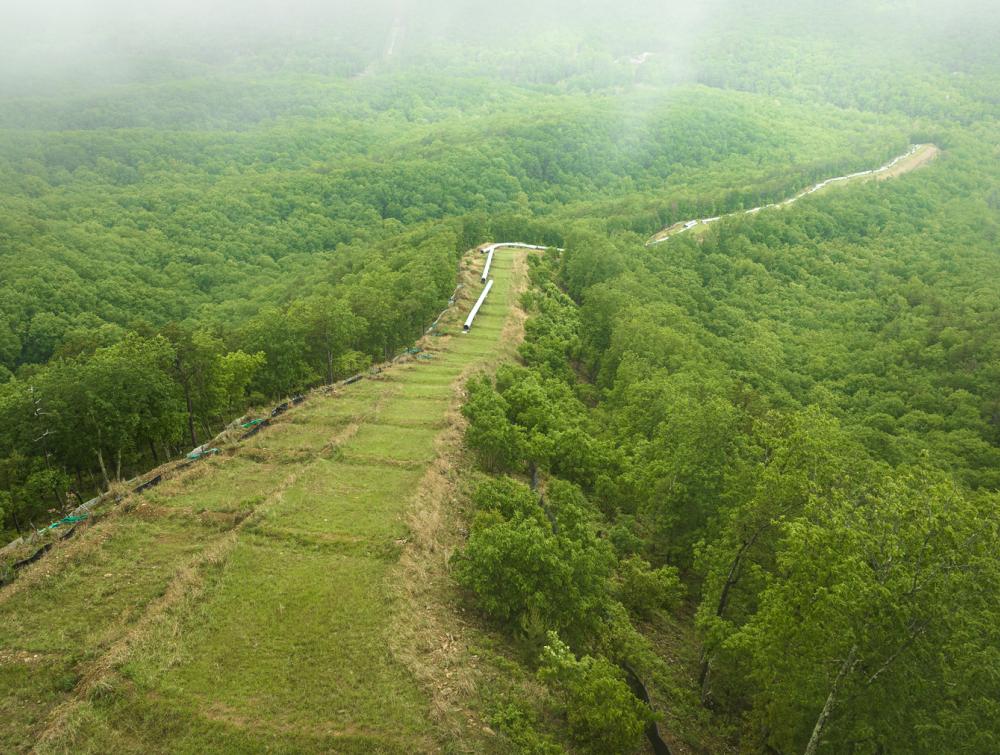Environmental Groups Argue Attempt to Throw Out MVP Lawsuits Unconstitutional

Site of Mountain Valley Pipeline through Jefferson National Forest, Virginia
Mason Cummings, TWS
Late yesterday, on behalf of The Wilderness Society, the Southern Environmental Law Center filed a brief opposing motions to dismiss from the Federal Government and a pipeline company in two cases involving the controversial Mountain Valley Pipeline (MVP) arguing that Section 324 of the Fiscal Responsibility Act violates the separation of powers and is unconstitutional. These cases pre-date passage of Section 324, a rider to the debt ceiling deal that attempted to bless the destructive project and mandate its completion earlier this month.
The Wilderness Society and SELC allege violations of multiple environmental laws in connection with defective approvals by the United States Forest Service and the Bureau of Land Management allowing the MVP to cross the Jefferson National Forest in Virginia and West Virginia.
In their response to the motions to dismiss, the organizations argue that Congress’s attempt to compel a win for MVP violates important separation of powers principles central to our Constitution and American system of government. Unchecked, Section 324 would set a dangerous precedent, letting Congress override the courts in violation of Constitutional principles and encouraging other controversial fossil-fuel projects to seek congressional intervention in the future.
“Mountain Valley could not build their pipeline in compliance with the law, so they appealed to Congress to interfere with the courts, skirting both our legal system and Constitution,” said Chase Huntley, VP of Strategy and Policy at The Wilderness Society. “The MVP rider buried in the Fiscal Responsibility Act attempts to ram through the pipeline, forcing it onto communities who have spoken out against its devastating impacts for nearly a decade. Because bedrock environmental laws stood in the pipeline's path, Mountain Valley convinced Congress to reach beyond its powers and decide in Mountain Valley’s favor, circumventing the courts. We’re fighting to make sure our challenge to the Forest Service and Bureau of Land Management’s approvals for the pipeline to cross the Jefferson National Forest has its rightful day in court.”
At the same time, lawyers from the Sierra Club, Appalachian Mountain Advocates, and Center for Biological Diversity on behalf of ten environmental groups — Wild Virginia, Appalachian Voices, Indian Creek Watershed Association, Preserve Bent Mountain, Preserve Giles County, West Virginia Highlands Conservancy, West Virginia Rivers Coalition, Chesapeake Climate Action Network, Sierra Club, and Center for Biological Diversity — filed a companion response to identical motions in another MVP case.
In previous litigation, the United States Court of Appeals for the Fourth Circuit has twice deemed amending the Jefferson National Forest Land Management Plan to allow the MVP (along with the BLM’s right-of-way and temporary-use permit grants) unlawful. The court held that the Forest Service and BLM “inadequately considered” harmful environmental effects of the pipeline and that the Forest Service improperly applied its own forest planning regulations. The court also directed the agencies to comprehensively re-examine the implications of allowing the proposed pipeline to cross the forest.
Sierra Club Senior Campaign Representative Caroline Hansley said, “Whatever happened to checks and balances? Congress should never have overextended its powers to try to tell the courts how to do their jobs. When communities, climate,and habitats are at risk, there is just too much at stake.”
The MVP is a proposed 303-mile natural gas pipeline that would cut through the Jefferson National Forest on the border of West Virginia and Virginia. In doing so, the pipeline would irreversibly scar public lands, leave waterways full of sediment, and expose local communities to threats from explosive leaks. To build its project across this public land, the pipeline company was required to obtain approvals from the Forest Service and the Bureau of Land Management.
“From the beginning, MVP was rammed through, with federal agencies bowing to political pressure. Now Congress has bowed to the developer’s interest too and tried to force the courts to get in line. With this challenge we, along with The Wilderness Society and other environmental and community groups, are standing up for our communities, our forests, and our right to seek justice from an independent court system,” said SELC President and Executive Director, DJ Gerken. “No one is above the law and the independent court system is the essential protector of our democracy. We continue to fight because it’s too dangerous not to.”
###
Media Contacts:
Tasha Durrett, SELC Communications, 571-405-1101 or tdurrett@selcva.org
Jen Parravani, The Wilderness Society, 202-631-1931 or jen_parravani@tws.org
Morgan Caplan, Sierra Club, Morgan.caplan@sierraclub.org
